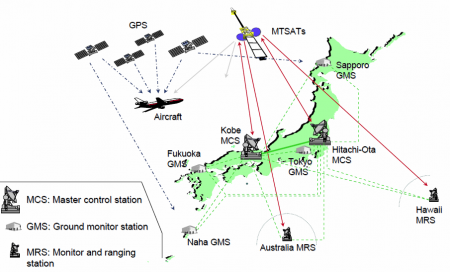If you wish to contribute or participate in the discussions about articles you are invited to contact the Editor
MSAS Ground Segment: Difference between revisions
No edit summary |
|||
| Line 21: | Line 21: | ||
The MSAS Ground Segment is completed with two '''Monitor and Ranging Station (MRS)''' in Hawaii (USA) and Camberra (Australia), whose purpose is primarily the correct orbit determination of the MTSAT satellites, and they also work as GMS stations. <ref>[http://www.oosa.unvienna.org/pdf/icg/2008/icg3/08-1.pdf Overview of MSAS, Presentation for ICG-3, 2008]</ref> | The MSAS Ground Segment is completed with two '''Monitor and Ranging Station (MRS)''' in Hawaii (USA) and Camberra (Australia), whose purpose is primarily the correct orbit determination of the MTSAT satellites, and they also work as GMS stations. <ref>[http://www.oosa.unvienna.org/pdf/icg/2008/icg3/08-1.pdf Overview of MSAS, Presentation for ICG-3, 2008]</ref> | ||
The prime contractor for the MSAS program is [http://www.nec.com NEC Corporation]. NEC manufactured and delivered MSAS under contract with the Civil Aviation Bureau, Ministry of Land, Infrastructure, Transport and Tourism of Japan. | |||
[[File:MSAS_Architecture.PNG|center|thumb|450px|MSAS Architecture]] | [[File:MSAS_Architecture.PNG|center|thumb|450px|MSAS Architecture]] | ||
Revision as of 11:48, 5 July 2011
| MSAS | |
|---|---|
| Title | MSAS Ground Segment |
| Author(s) | GMV. |
| Level | Basic |
| Year of Publication | 2011 |
The Multi-functional Satellite Augmentation System (MSAS) is the Japanese SBAS System: a GPS Augmentation system with the goal of improving its accuracy, integrity, and availability, and that uses the Multifunctional Transport Satellites (MTSAT) owned and operated by the Japanese Ministry of Land, Infrastructure and Transport and the Japan Meteorological Agency (JMA). Tests had been accomplished successfully, and MSAS for aviation use was commissioned on September 27, 2007.[1]
MSAS receives GPS signal at the Ground Monitor Stations and the Monitor & Ranging Stations, checks operational status of GPS, analyze GPS error and ionospheric delay, and then broadcasts augmentation information through MTSAT (Multi-functional Transport Satellite)[2] from the Master Control Stations. Those satellites, MTSAT, broadcast the correction messages back to Earth, where MSAS-enabled GPS receivers use the corrections while computing their positions to improve accuracy.
MSAS Ground Segment
The MSAS Ground Segment is composed of four Ground Monitor Station (GMS) that collect information on the GPS and MTSAT signals. They are placed on Sapporo, Tokyo, Fukuoka and Naha.
The GMS stations send their data to two Master Control Station (MCS) in Kobe and Hitachiota, that compute precise differential corrections and integrity bounds and send them to the MTSAT satellites for rebroadcast to the User Segment.
The MSAS Ground Segment is completed with two Monitor and Ranging Station (MRS) in Hawaii (USA) and Camberra (Australia), whose purpose is primarily the correct orbit determination of the MTSAT satellites, and they also work as GMS stations. [3]
The prime contractor for the MSAS program is NEC Corporation. NEC manufactured and delivered MSAS under contract with the Civil Aviation Bureau, Ministry of Land, Infrastructure, Transport and Tourism of Japan.

